Quick Answer
To become a teacher in Texas, you have two routes.
For the Traditional Route, you’ll need to:
- Earn your bachelor’s degree
- Complete an EPP
- Pass your exams
- Submit your application
- Complete background check & fingerprinting
For the Alternative Route, you’ll need to:
- Decide what you want to teach
- Enroll in an approved ACP
- Obtain a Teaching Position (SOE)
- Apply for a Probationary Certificate
- Complete requirements for a Texas teaching certificate.
- Submit your application
So you want to learn how to become a teacher in Texas? Well, you’re in the right place!
In this article, you’ll learn everything you need to know about becoming a teacher in Texas so you can confidently take the next steps in your teacher certification journey.
Here at 240 Certification, we’ve helped 1000s of teachers get certified in Texas, so we know a thing or two about what it takes to become a teacher in the Lone Star State!
How to become a teacher in Texas
As we mentioned in the "quick answer" section, there are two ways to become a certified teacher in Texas: the traditional route and the alternative route.
We are going to walk you through both, starting with the traditional route.
Traditional Teacher Certification
1. Get your Bachelor's degree
You must obtain a bachelor's degree from an accredited college or university to teach in Texas.
2. Complete an EPP
An EPP is an educator preparation program that meets the Texas Administrative Code (TAC) requirements.
Most programs require 150 hours of coursework, 50 observation hours, and passing your content exams.
How do you find an EPP to join?
If you take the traditional route to certification, you will complete an approved EPP through your college or university while earning your bachelor's degree.
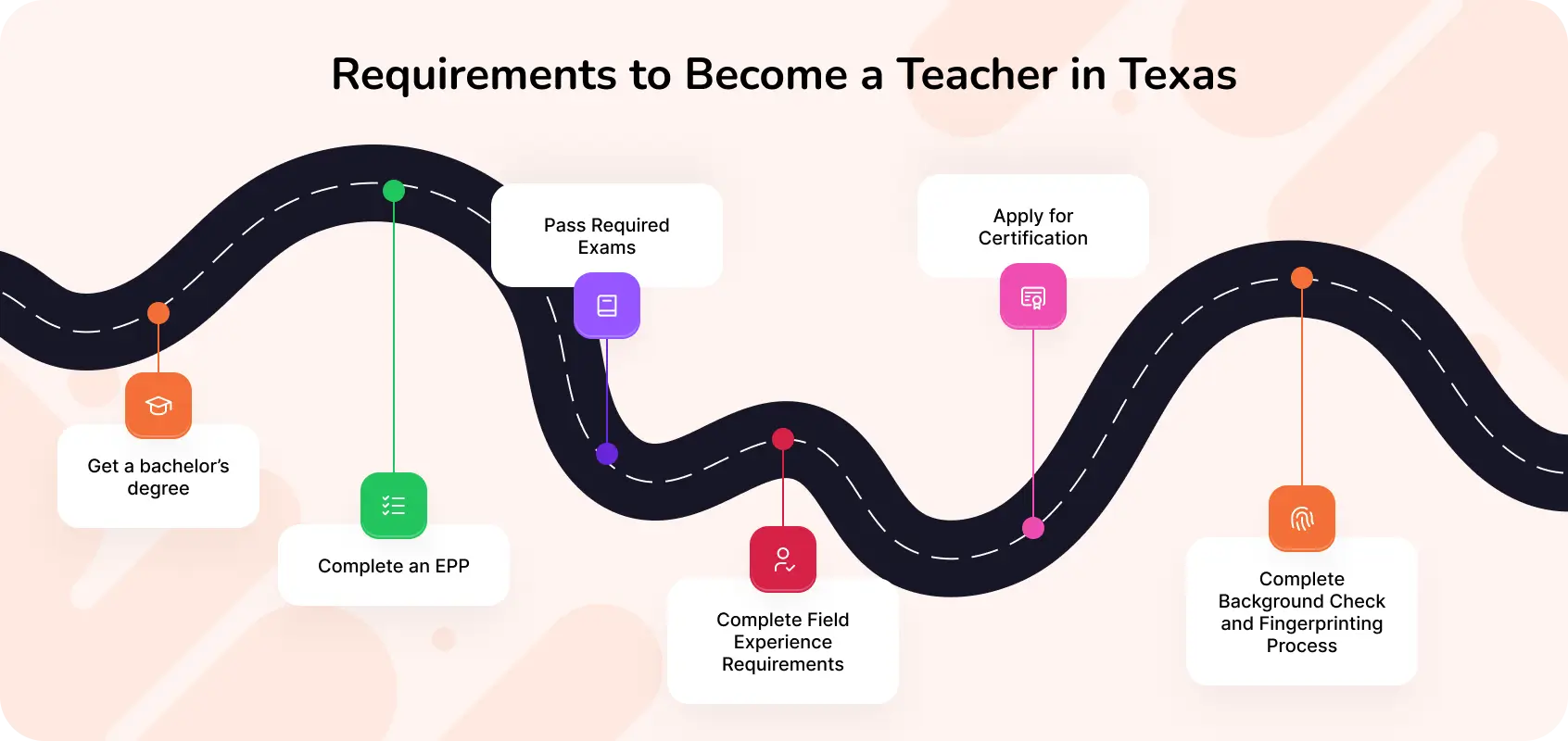
3. Pass Required Exams
The TExES is the main testing series in Texas.
Which TExES exam(s) you'll need to take depends on which subject and grade level you want to teach.
But overall, you'll be required to take both content and PPR (Pedagogy and Professional Responsibilities) exams.
The content exam is for the subject you want to teach.
For example, if you wanted to be a math teacher, you would take a math content exam, and if you wanted to be a social studies teacher, you would take a social studies content exam, and so on.
The PPR exam tests whether a candidate has the knowledge and skills needed to be an entry-level teacher in a public school in Texas.
The Science of Teaching Reading (STR) exam is also now required for the issuance of five certification fields:
- Early Childhood: EC – Grade 3
- Core Subjects: EC – Grade 6
- Core Subjects: Grades 4 – 8
- English Language Arts and Reading Grades 4 – 8
- English Language Arts and Reading/Social Studies Grades 4–8
EPPs differ in when they require candidates to take state exams throughout the program.
Once you have been successfully admitted into an EPP, you will need approval from your program to take the required exams for certification.
Pro Tip
Most districts in Texas require teachers to have an ESL certification, so it is a good idea to also take the TExES ESL Supplemental exam.
So, how will you pass your exams? Don't worry; we've got you covered!
Check out this free download to help you prepare for your TExES exams.
4. Field Experience
Depending on whether you choose a traditional or alternative certification route to teaching, you will be required to have observation hours and a teaching internship, clinical, or residency.
All alternative certification programs require a minimum of 50 observation hours and a one or two-semester teaching internship, clinical, or residency in the classroom.
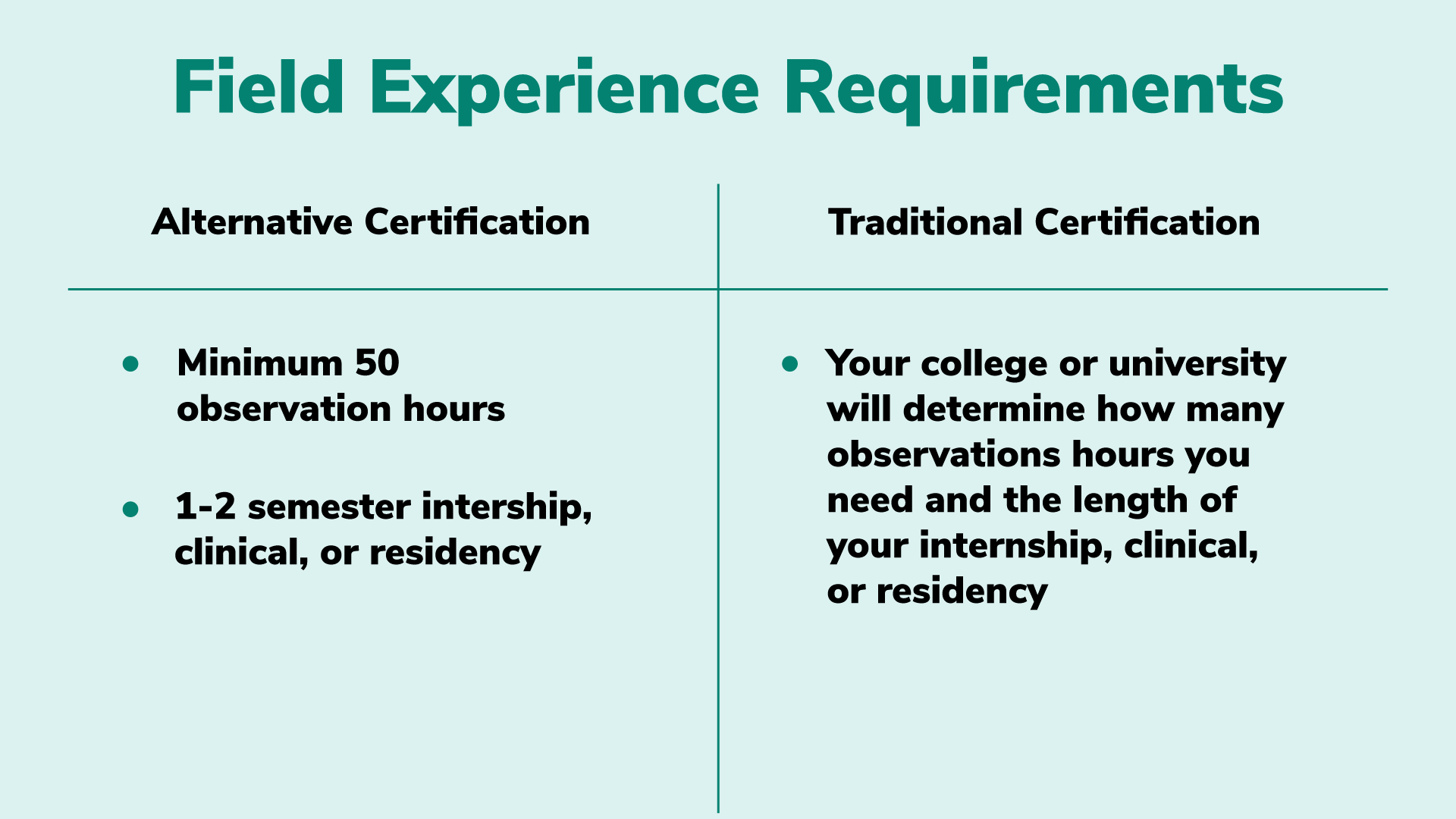
If you go the traditional route, your college or university will determine how many observation hours you will need and the length of internship, clinical, or residency required for your degree plan.
5. Apply for Certification
After completing your EPP requirements, you must apply for certification by logging into your TEAL account.

Under your Educator Certification Account, you will find your ECOS account, where you can fill out the application and pay the fee.
The fee to apply for certification is $78.
Once you have successfully applied and paid for an application for certification, you will be ready for the next step.
6. Background Check and Fingerprinting
All candidates must pay a $49 fee to be fingerprinted for a national criminal history check before a Texas teacher certification can be issued.
Having a criminal history could prevent you from becoming a teacher in Texas.
Criminal histories are reviewed individually, and many factors are considered.
You can check your fingerprint status through your ECOS account by logging into your TEAL account.
Alternative Teacher Certification
Becoming a teacher in Texas through alternative certification includes some of the same steps as the traditional route: enrolling in a program, passing your exams, background check, etc.
But there are a few differences that make the path unique, so let's walk through the steps of alternative certification.
1. Decide what you want to teach
Have you decided what you want to teach?
Before becoming certified, you must decide what grade levels and subject areas you want to teach.
This will help you determine the program you must enroll in and what certification tests you must take and pass.
2. Pick an approved ACP
If you are looking for a list of Texas Education Agency (TEA)-approved Alternative Certification Programs (ACPs), you can find it on the official TEA website.
To access the list, simply visit the TEA website and navigate to the ACP page.
Once there, you can filter out other alternative certification programs by selecting the "Alternative" option.
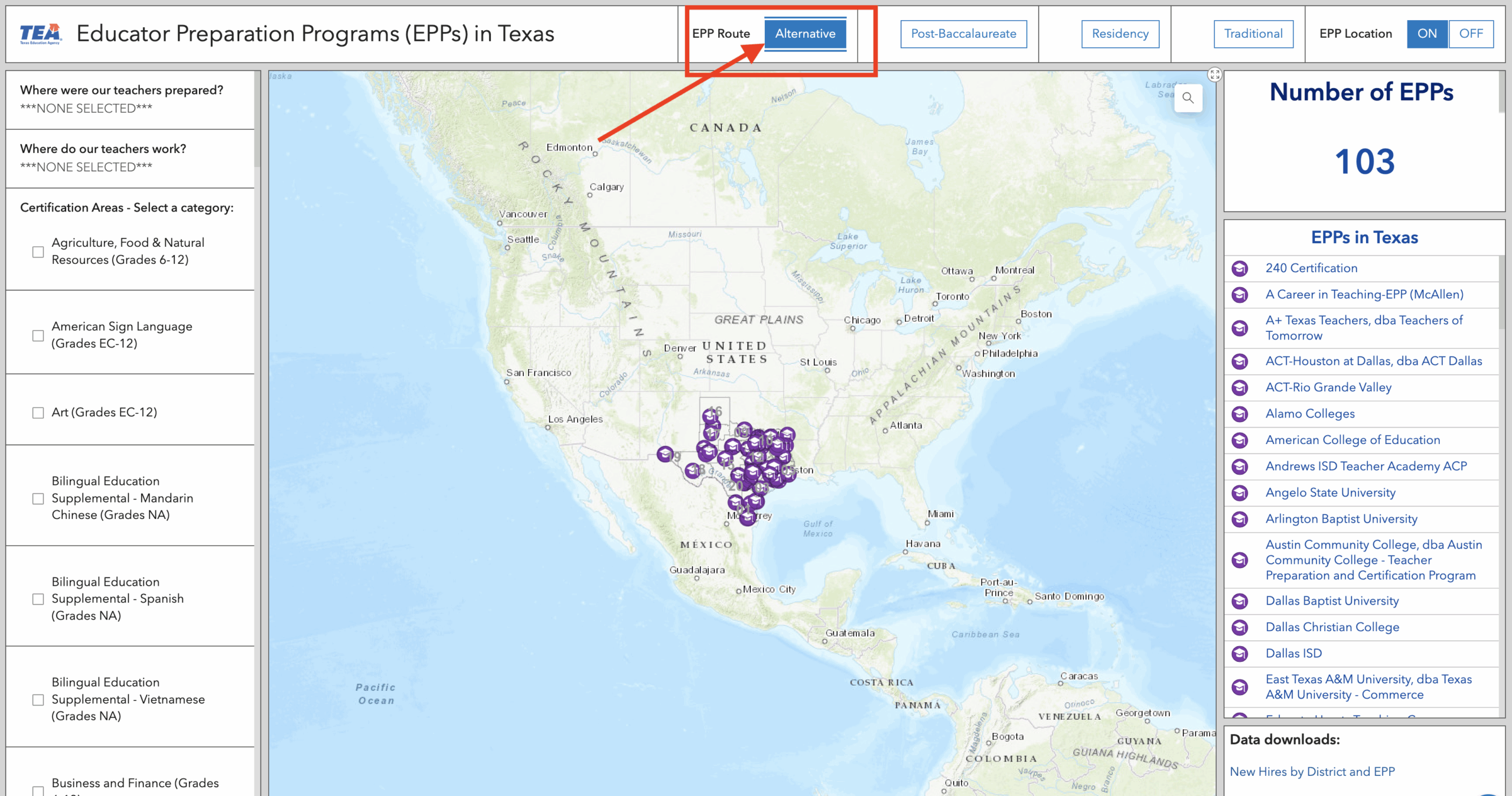
This will give you a full list of TEA-approved ACPs in Texas that meet the necessary standards and requirements.
3. Apply for ACP
To apply for an alternative certification program, you must have a bachelor's degree or be in the final semester of receiving your bachelor's degree.
Another entry requirement is having a 2.5 GPA.
If your overall GPA is less than 2.5, your last 60 hours will be calculated to see if it reaches 2.5.
You may be required to take the Pre-Admission Content Test or PACT if your GPA is lower than 2.5 or you need more coursework hours to support the certification area of your choice.
Some of these requirements are state-mandated, but individual ACPs may have additional requirements for acceptance.
*Calculate your last 60 hours here: GPA Calculator
Note
Many programs will accept a passed Pre-Admission Content Test or PACT instead of a 2.5 GPA.
4. Start Working on your Program Requirements
Once you’ve been accepted into your program, you will start working to complete the program’s requirements.
These are some of those things we mentioned before that are very similar to the traditional route.
These requirements include passing your content tests, meeting your 50-hour observation requirement, and completing 150 hours of coursework.
5. Obtain a Teaching Position - SOE
Once you are eligible for a teaching internship or position (which is after you have completed the requirements listed in step 4) you will be provided with an eligibility statement, more commonly known as a Statement of Eligibility (SOE) for employment purposes.
This statement will allow you to be a completely hirable teacher!
Note: if you are going the intern route, you must obtain a teaching position that is the grade level and subject area of your target certification.
6. Apply for an Intern or Probationary Teaching Certificate
Once you have secured an internship, you must apply for an intern or probationary teaching certificate.
The only way to be able to apply for an intern or probationary certificate is by being enrolled in an approved educator preparation program and completing a supervised internship at a TEA-accredited school.
You must have passed one or more content exams tied to your certification area to obtain your intern certificate.
You must have passed all of your content and PPR exams to obtain a probationary certificate. Both of these certifications are valid for one year and will require you to get a criminal background check.
7. Complete all requirements for a Texas teaching certificate.
To obtain a standard certification, candidates must complete program requirements, including observations, coursework, and a successful clinical experience (clinical teaching or a full-year internship, serving as a paid teacher of record) and pass all content and pedagogy exams.
8. Apply for a standard Texas teaching certificate.
Once you have completed all your requirements, you will apply for a standard teaching certificate in Texas.
You will be required to complete the appropriate paperwork, forms, and fees.
When your certificate is approved, it will be posted to the Texas Education Agency (TEA) website, and you will receive an email notification.
Then, you will be legally certified to teach in Texas! Yay!
What's the difference between Traditional & Alternative Certification?
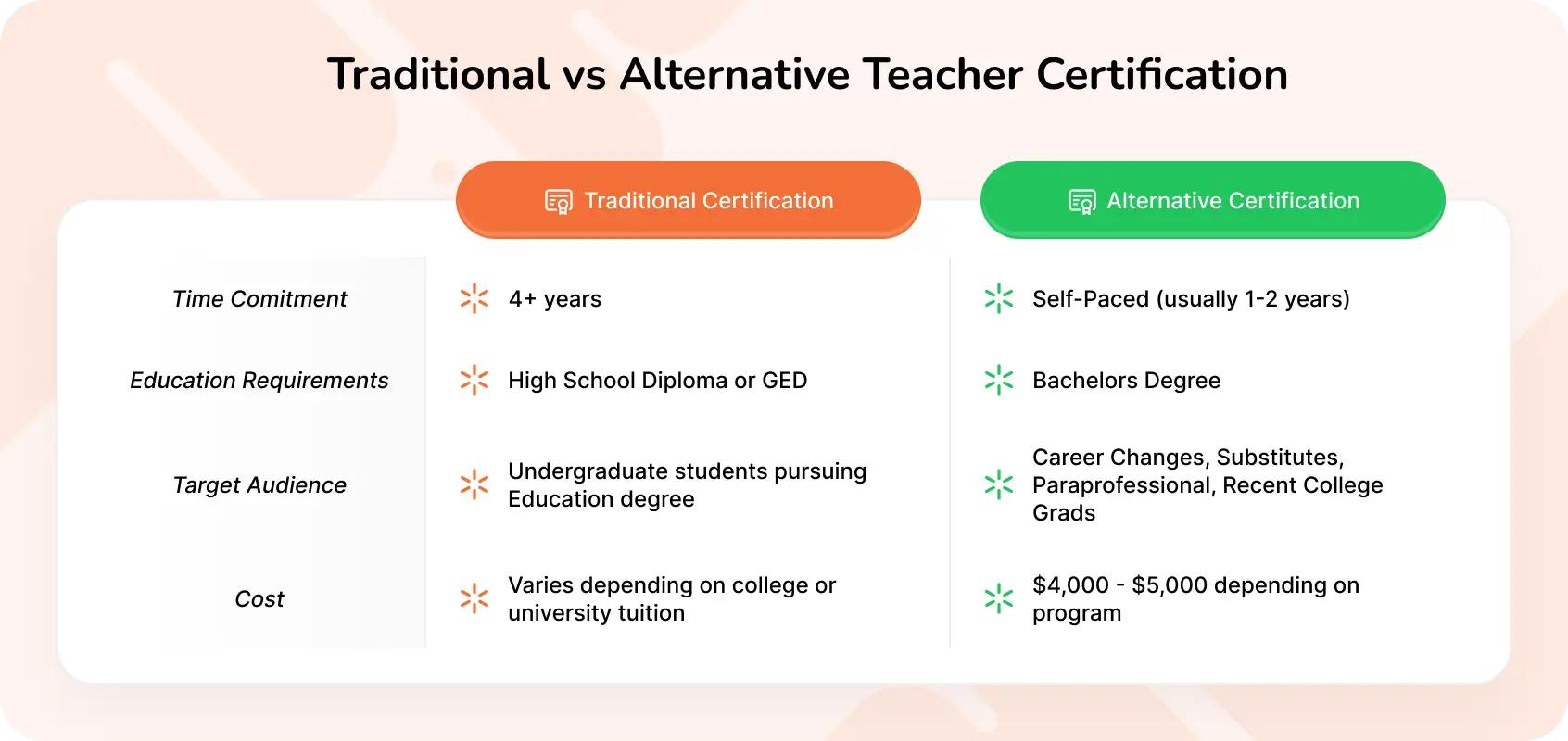
Traditional Route
If you choose a traditional route to become a teacher in Texas, you usually enter college knowing you want to complete a bachelor's degree in education.
A traditional route to Texas teacher certification begins with acceptance into a college or university to complete your bachelor's degree.
You will then complete an approved EPP through your college or university once you have declared your major.
If you do not have a bachelor's degree, then a traditional route to teacher certification is right for you!
You can find more information on some of the best traditional programs through TEA.
Once there, you can filter out other programs by selecting the "Traditional" option.

These programs will be completed through your undergraduate degree plan and within the timeline of your college's or univeristy's EPP.
Alternative Teacher Certification
Unlike a traditional route to certification, alternative certification programs require you to have completed your Bachelor's degree or be in your last semester of completing your Bachelor's degree.
You can apply for the alternative certification program of your choice after completing a bachelor's degree or in your final semester.
Once enrolled in the program, you must complete 150 coursework hours and 50 hours of observation and pass your certification exams.
There are many ACPs, so taking your time and finding the best program is important.
How much does it cost to become a teacher in Texas?
Your costs will vary depending on the education preparation program you choose and what subject(s) and grade level certifications you seek.
Let's gauge your potential costs by walking you through the costs of becoming an elementary school teacher in Texas through an alternative certification program (ACP).
Certification Program Costs
First, you will want to apply and enroll in an approved ACP, where you will get paid during your internship year.
For example: 240 Certification will cost you $4,135.
The prices of ACPs in Texas vary but most of them are between $4,000-$5,000.
Exam Costs
Next, lets look at what certification exams a candidate who wants to become an elementary school teacher in Texas needs to take.
This candidate will need to take 3-4 TExES exams.
The English as a Second Language Supplemental is optional but required for teachers in most Texas school districts.
The total costs of all exams come to $464 (each exam costs $116).
Exams can be expensive, so some districts reimburse current and future teachers to take their TExES and/or PACT exams.
Retake Costs
You will also need to consider any retake fees if you do not pass your certification tests on the first try.
If your exam has multiple subject exams, you can retake whichever subject (s) you did not pass.
Look at the Core Subjects EC–6, which has 5 subject exams.
If you do not pass one or two of the subject exams, you must retake each subject exam for $58 each.
Note
There is a 5-attempt limit for TExES certification tests. So, each time you take an individual subject or an overall exam, each testing session counts as one attempt. If you need more than five attempts, you can apply for a Test-Limit Waiver.
How long does it take to become a teacher in Texas?
The amount of time it takes to become a teacher in Texas depends on which path to certification you take.
Your current qualifications, financial situation, and where you live all play a factor in determining which option is best for you.
Traditional Route Timeline
If you take the traditional route, you will usually spend four years pursuing a Bachelor’s degree in education from an accredited college.
Through your degree plan, you will complete an educator preparation program (EPP) that will prepare you for your field of study.
You will have field observation hours and a one to two-year internship in your last year, which is unpaid.
Most undergraduates complete their degree plans in four years.
If you have completed a lot of your college basics beforehand, you could complete an education degree in two to three years, as long as your college credits transfer to your new degree.
Alternative Route Timeline
If you have a Bachelor’s degree, the fastest way to certification is alternative certification.
In as little as 18 months, you could be teaching in your own classroom!
Alternative certification programs offer paid internships, which get you into the classroom faster and provide you with full benefits in a school district of your choice.
Additional Timelines:
If you have a Bachelor’s degree and would like to pursue a Master’s degree, you could enroll in an accredited program to obtain your Master's in Education.
Graduate programs can be completed in two years and will give you the credentials you will need to be eligible to apply for certification.
Most districts in Texas offer a pay raise or stipend for teachers with a Master's Degree—that’s a great perk!
You will want to weigh your options by considering your time, finances, and what future plans each degree and path will provide you with to determine which option works best for you.
How much do teachers get paid in Texas?
According to the NEA, the average salary for a starting teacher in Texas is $48,526.
Teacher salaries in Texas are on a step scale based on years of service, so veteran teachers earn an average of $62,463 in Texas.

If you take the traditional route, you can get hired and earn an income with full benefits as soon as you graduate, pass your certification exams, and apply for certification.
If you use an alternative certification program, you can start getting paid and receiving full benefits during your internship year on an intern certification.
Many districts in Texas offer stipends to teachers for extracurricular activities, the teacher incentive allotment (TIA) program, having certifications that label them as highly qualified, and having a Master's degree.
If you're interested in advancing your career outside of the classroom, there are multiple educational opportunities to use your Bachelor's degree to move into other positions.
If you are interested in administration and becoming a principal, many Master's programs are 100% online that you can complete while still teaching in the classroom.
The average principal salary in Texas is $102,000.
How to find a teaching job in Texas
If you are taking a traditional route to certification, you should start applying for jobs during your last semester before earning your bachelor's degree.
In Texas, you can apply for multiple districts through a regional application or to each school district individually.
Larger districts will hold job fairs for representatives from each school to attend.
Smaller districts typically send a few representatives to regional job fairs, where multiple districts are in attendance.
Utilize every opportunity to network with districts you are interested in finding employment.
Job boards are also a great place to find job postings for multiple districts you are interested in teaching.
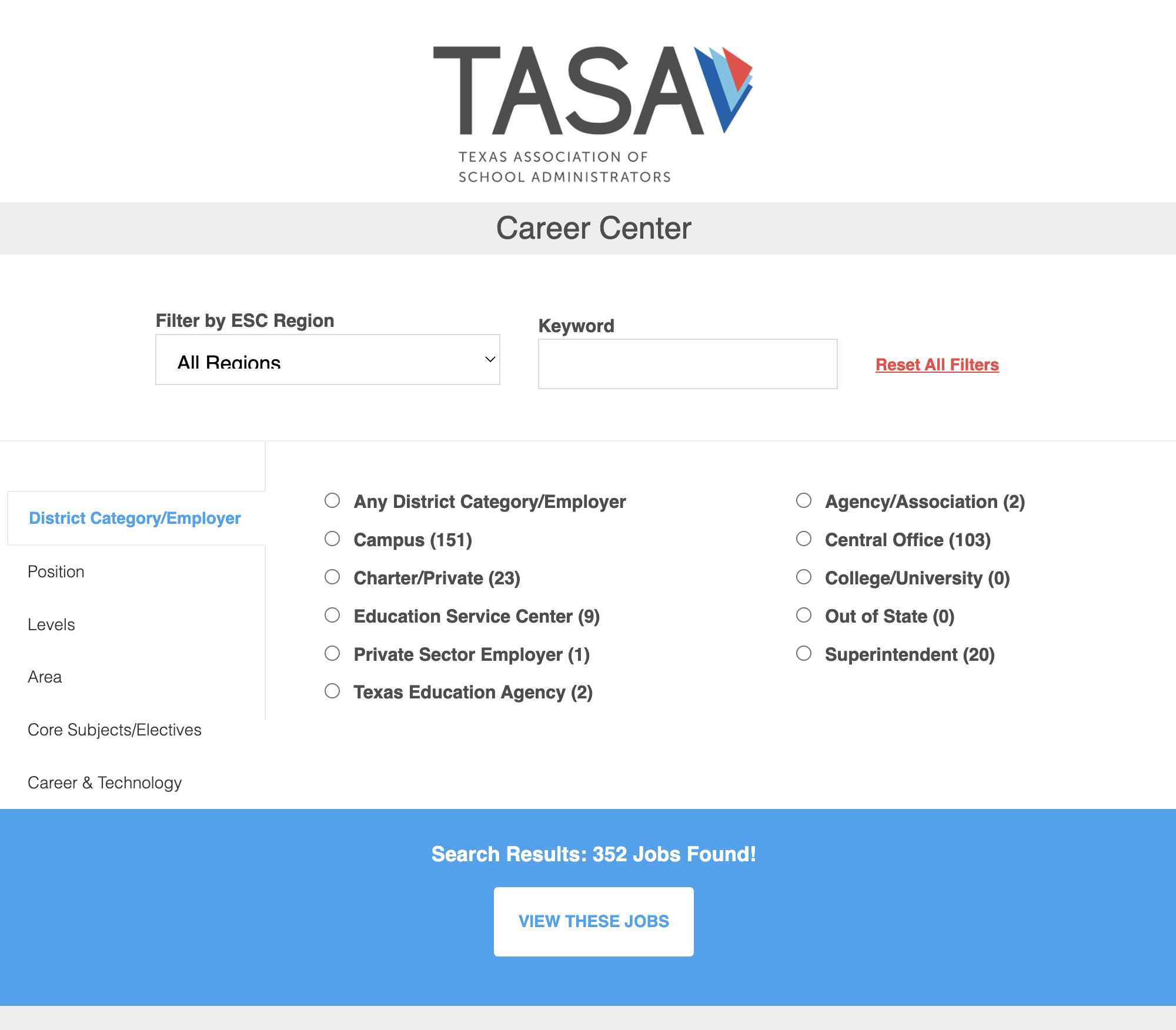
The Texas Association of School Administration for example has a great tool to search for open teaching jobs in Texas.
You can filter by region, position type, grade level, or subject and receive a list of open positions that match your filters!
What subjects/grade levels can I teach?
In Texas, you can teach a wide range of subjects and grade levels, depending on your preference and education level.
The TExES certification exams are split up into grade levels and/or content areas, allowing some exams to overlap grade levels and provide options on which grade level you can teach in that content area.
Elementary
If you are passionate about teaching the youngest generation within an elementary school setting you must take your TExES Core Subjects EC – 6 exams with the Science of Teaching Reading (STR).
Many elementary schools in Texas are pre-kindergarten through grade 5 or 6, and this certification will allow you to teach four core subjects, music, fine arts/theatre, PE/Health, and all grade levels up to grade 6.
Middle School
If you are leaning towards teaching middle school students but are unsure which subject area you prefer, taking the Core Subjects 4 – 8 exam would be beneficial.
The majority of middle schools in Texas consist of grades 6 – 8.
High School
If you are pursuing secondary education, figuring out which subject area you prefer to teach will help you decide which TExES content exam you need to take.
Now, if you are unsure which grade level you would like to teach but know which subject area you enjoy, taking both certification exams in that content area would benefit you and make you a highly qualified applicant.
Some of the exams that overlap include:
- English Language Arts and Reading 4 – 8 and English Language Arts and Reading 7 – 12
- Mathematics 4 – 8 and Mathematics 7 – 12
- Science 4 – 8 and Science 7 – 12
- Social Studies 4 – 8 and Social Studies 7 – 12
What Texas districts can I teach in?
Location, personal relationships, school reputations, and job vacancies are all important factors when considering which districts in Texas you want to teach in.
Texas is huge, so it's best to break it down by educational regions to make it easier to find which district is best for you.
Texas currently has 20 Regional Education Service Centers (ESCs).
Each ESC has a group of surrounding school districts it supports to help them abide by the Texas Education Agency (TEA) guidelines and provide resources for educators.
You can check out a map of all the districts in Texas using the School District Locator by TEA.
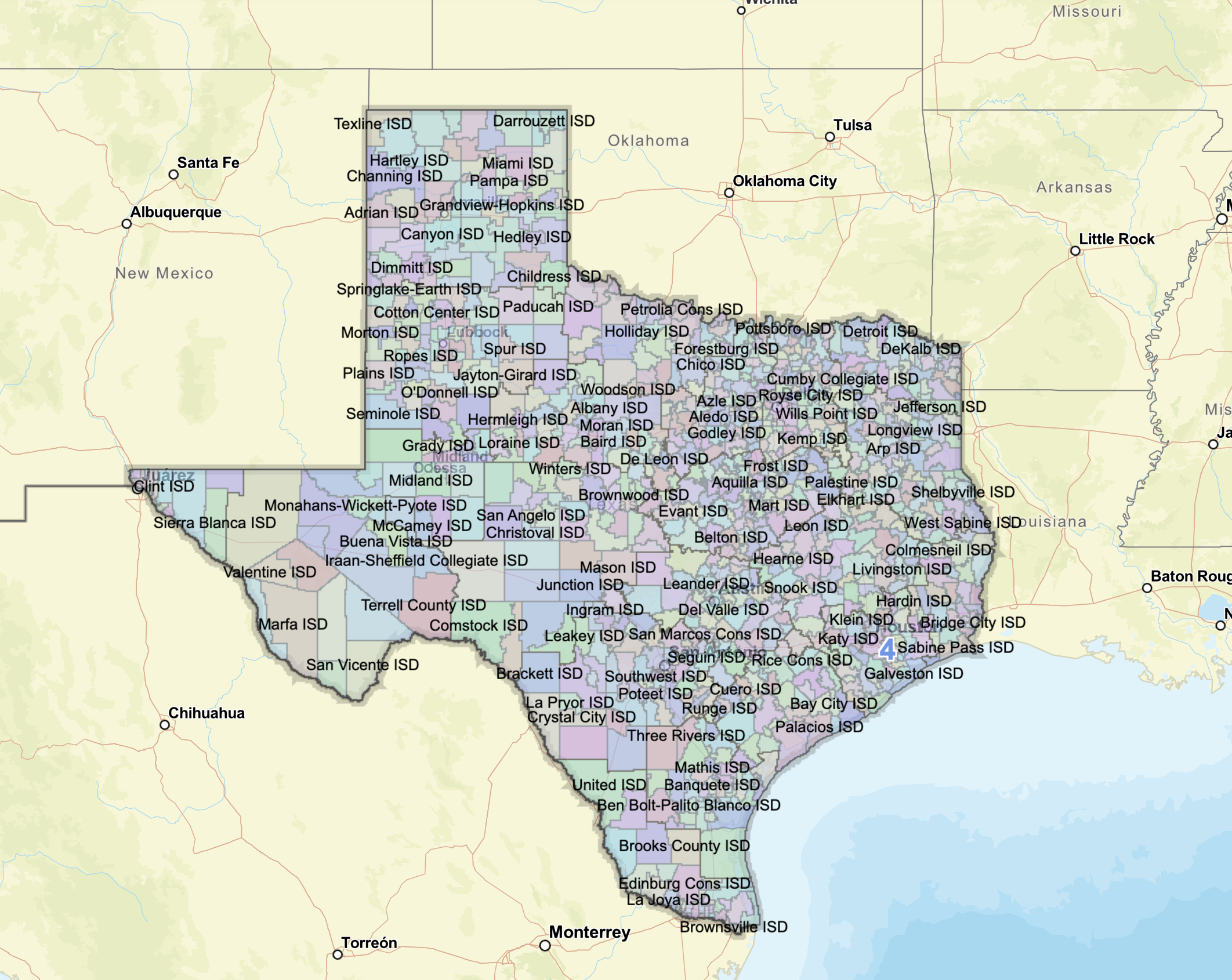
TEA rates Texas school districts on an A-F rating scale.
You can use the TEA website to learn more about the rating of specific campuses, districts, regions, or the entire state of Texas by viewing their accountability report.
Narrowing down the areas you want to apply for and searching district websites for job listings are great places to start.
Each district in Texas has multiple resources on its website to help you find which district is best for you!
Clinical Teaching
Clinical teaching, also more commonly referred to as student teaching, is a beneficial and required step for Texas teachers to earn their certification.
Whatever path you take, traditional or alternative certification requires observation hours and an internship (1 or 2 semesters).
Many EPPs offer paid and unpaid student teaching options depending on whether you pursue a semester or year-long internship.
When searching for a program, look for one that provides you with a program advisor who will be with you every step of your journey to teacher certification.
How do you become a substitute teacher or paraprofessional?
Substitute Teaching
If you have a high school diploma or GED, then you most likely can work as a substitute teacher in Texas.
Every school district in Texas determines their own requirements for employment for substitute teachers, so you should check with the school district you are interested in subbing in to know exactly what you need to be employable.
Many school districts in Texas desperately need substitute teachers and offer competitive pay depending on your level of education and certification.
Pro Tip
If you are available to sub on a Thursday or Friday, school districts in the DFW metroplex need more subs on those days and are paying substitutes a higher daily rate when they sub on certain days.
Paraprofessional
If you are looking for a steadier schedule, Paraprofessionals work a full contract year and have a more consistent paycheck than substitutes.
The requirements to become a paraprofessional differ from those of a substitute teacher, so you must check with the school district where you are interested in working to know exactly what you need to be employable
Once you are hired as a paraprofessional, your district of employment will recommend you for certification, where you can apply for an Educational Aide Certification through a TEAL account.
Unlike full-time teachers in Texas, substitute teachers and paraprofessionals do not need a Bachelor's degree to complete an EPP program or take certification exams.
Historically, many teacher candidates have started out as substitute teachers or paraprofessionals.
What if I'm coming from another state or country?
If you are coming from another state or country you will need to apply for a review of your credentials through the Educator Certification Online System (ECOS) which can be accessed through a TEAL account.
Once your credentials have been reviewed, TEA will provide next steps for continuing in the certification journey.
Texas currently does not have reciprocity with any other states.
Frequently Asked Questions
Unfortunately, no. While you cannot be a teacher of record, you can be a substitute teacher or paraprofessional. So, while the answer is no to being a certified teacher, there are still many ways you can be a part of education! Many Texas school districts allow substitute teachers with a high-school diploma or GED to substitute teach. You need to check with individual districts to know what qualifications they require of their substitutes and paraprofessionals. Many districts in Texas have a substitute shortage and encourage those passionate about teaching to apply!
This answer might shock you! Did you know you can become a teacher in Texas in as little as 12-18 months? With a teacher alternative certification program like 240 Certification, you can apply once you are in the final semester of completing your Bachelor’s degree. Already completed a Bachelor’s degree? Great! Your journey to teacher certification in Texas can begin now with 240 Certification.
Absolutely! If you want to become a teacher in Texas, you do not need a degree in education. If you are looking for a new career path, 240 Certification offers a teacher alternative certification program to help you become a certified teacher in Texas. Hear from these individuals who made the leap!
Absolutely! A huge perk of seeking alternative certification in Texas through a TEA-approved EPP is the ability to teach in a classroom while you earn your certification. 240 Certification has partnered with many Texas school districts to allow candidates to be hired and receive full pay and benefits while completing their year-long internship. Once you have completed 150 coursework hours, 50 observation hours, and passed your content exam(s), you will be issued a Statement of Eligibility (SOE). Once you have received your SOE, you can apply for your intern certification and begin teaching in your own classroom while earning your certification.
Texas does offer emergency teacher certification, but it’s managed by school districts—not certification programs. With several pathways available, the options can be confusing. Alternative certification remains one of the most streamlined ways to enter the classroom quickly. If you’re looking for a clear and supported path, choosing a program like 240 Certification can guide you through the process and get you teaching fast.
When starting a new career, you must consider what you will be paid for in those first few years. According to the NEA, the average salary for a starting teacher in Texas is $48,526. Once you have some earned years of service, veteran teachers earn an average of $62,463 in Texas.
Ready to start your certification journey?
Is Alt-Cert Right for You?
Use our Teacher Journey Pathfinder to let us know more about your unique situation and we’ll help you get started.


